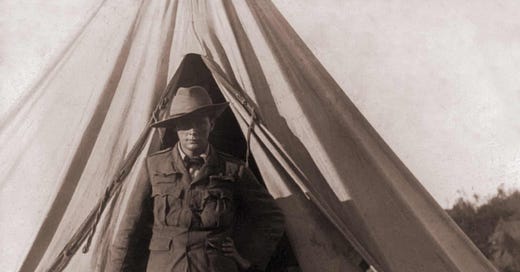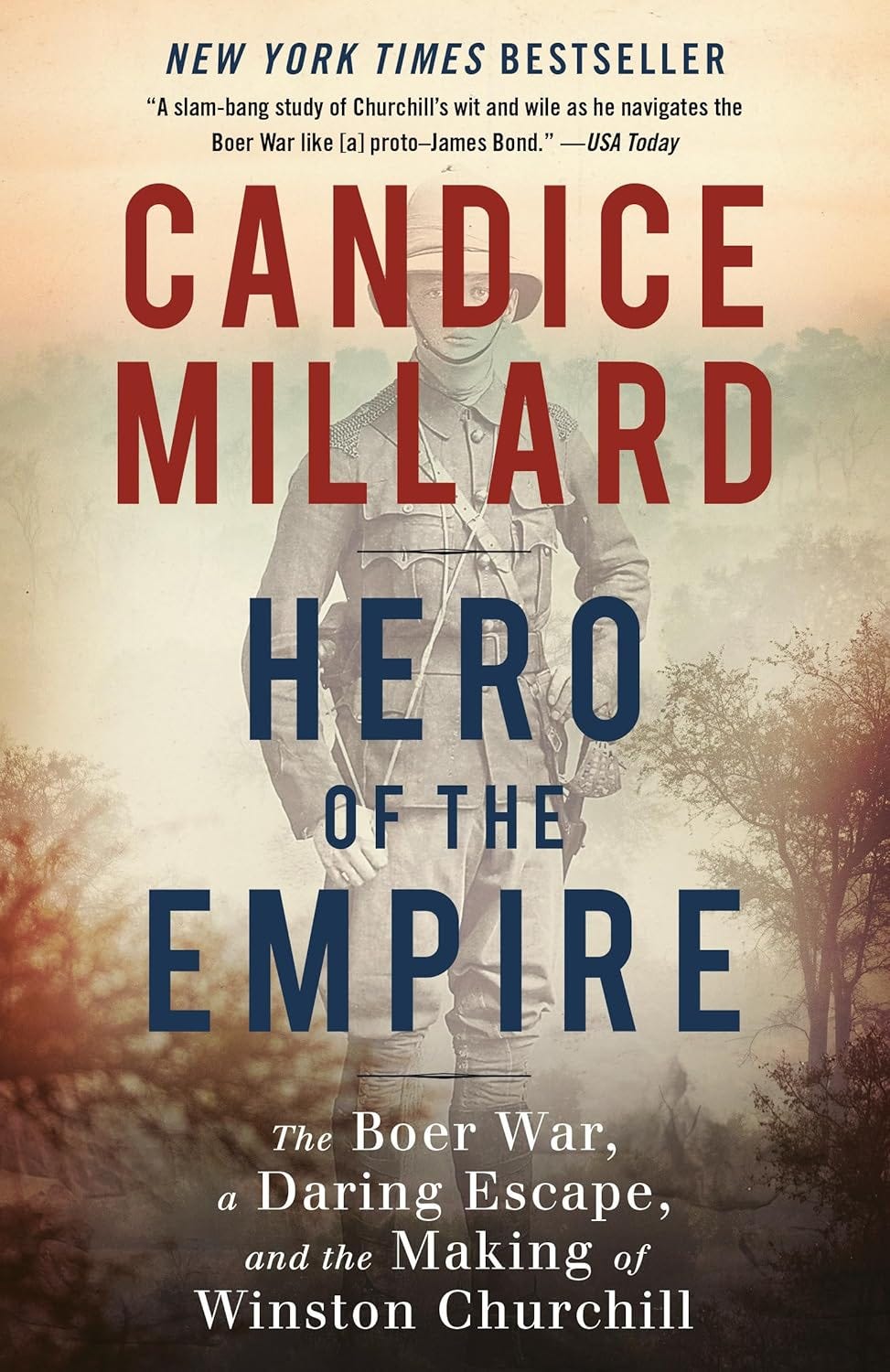Good evening!
This past week, I read Candice Millard’s Hero of the Empire, a narrative nonfiction account of Winston Churchill’s experience during the Boer War, and Ann Patchett’s Bel Canto, a historical fiction book about a hostage situation in South America. Let’s get into it.
What I read:
Hero of the Empire: The Boer War, a Daring Escape, and the Making of Winston Churchill by Candice Millard
Hero of the Empire chronicles Winston Churchill’s time as a young reporter covering the Second Boer War (1899-1902), a conflict between the British Empire and the two Boer republics (the South African Republic and the Orange Free State). Millard chronicles Churchill’s daring escape from a POW camp.
Churchill spent his early 20s trying to distinguish himself from his aristocratic family. He served as an officer in the British Army in both India and Sudan and worked as a journalist covering the 1895 Cuban uprising against the Spanish (his love of cigars started in Cuba). Millard writes that he “returned home every time without the medals that mattered, no more distinguished or famous than he had been when he set out.” Shortly before he left for South Africa, Churchill also ran for a seat in Parliament but lost the election.
At age 24, Churchill went to South Africa. True to his privileged roots, Churchill traveled with a personal valet and $4,000 of fine wine and spirits (18 bottles of St.-Émillion and 18 bottles of a 10-year-old scotch). While Churchill traveled with the fine comforts of home, the Second Boer War was a brutal guerrilla war. The British troops had to adapt to the Boers’ fighting style. They were forced to abandon their “redcoats” in favor of khaki to better blend into their surroundings (Burberry designed the officer uniforms and raincoats—the brand would later design their classic “trench coats” for WWI soldiers fighting in the trenches).
Just two weeks after Churchill arrived, Boers ambushed his train car and captured him. He spent a month as a prisoner of war before escaping. He left with no map and just “four slabs of melting chocolate and a crumbling biscuit” in his pocket. Nevertheless, he managed to travel through 300 miles of enemy territory back to the British troops. His audacious escape captured the British press’s attention (this was partly due to the lack of feel-good stories about the British troops).
In a particularly engaging epilogue, Millard explains how Churchill reenlisted in the army and liberated the POW camp from which he escaped. He finally earned the recognition he yearned for and subsequently won his first election in 1900 when he returned to England.
While it is easy to get swept up in Churchill’s movie-worthy escape, Millard also discusses the human cost of the war in the epilogue. Millard writes, “Some thirty thousand Boer farms would be left in black, smoldering ruins.” The British put the displaced Boers (primarily women and children) in concentration camps. The concept of a concentration camp was not new, but it was the first time the term was used. As Millard explains,
More than that, it was the first time the camps had targeted a whole country and depopulated entire regions. Although the British did not intentionally kill their captives, they committed . . . “slow murder.” The camps quickly multiplied until there were some 45 of them scatted across South Africa. They did not have nearly enough food for their thousands of inmates. There was little to no medical care, and the sanitary conditions were not only appalling, but deadly. By the end of the war, more than 26,000 Boer civilians would die in British concentration camps, some 22,000 of whom were children. Those statistics, however, do not even take into account the roughly 20,000 Africans who, having been forced to fight in a war that was not their own, subsequently died in separate black concentration camps.
Opinion: Hero of the Empire is the first book by Candice Millard I’ve read. She takes what might at first blush seem like a peripheral episode in Churchill’s prominent life and writes about it in cinematic prose. While there are some slow sections, the best parts of this book read like a thriller. I love the writing style and felt completely immersed in Churchill’s world and life. I definitely recommend this to anyone who loves narrative nonfiction or any Winston Churchill fan.
Rating: 4/5
Genre: Narrative Nonfiction
Page count: 416 pages
Audio: 10 hours 14 minutes
Food pairings: Chocolate bar
Bel Canto by Ann Patchett
Bel Canto follows a lengthy fictional hostage crisis in an unnamed South American country. A Japanese businessman, Katsumi Hosokawa, is hosting a birthday party at the home of the country’s vice president. Katsumi loves opera and has invited Roxane Coss, a world-famous opera soprano, to perform for the guests. At the end of Roxane’s performance, a group of armed terrorists take the party hostage and seize the vice president’s home. Patchett follows the captors and captives through the long months of the hostage situation.
The group slowly falls into an odd rhythm. The kidnappers have failed in their mission to capture the country’s president, who stayed home that night. They turn their attention to Roxane and are bewitched by her singing.
The captives are from various countries and do not share a common language. Katsumi’s translator, Gen, steps in as an intermediary. It proves to be a Stockholm syndrome situation, where the captives and captors have no desire to be freed. Katsumi is quietly excited to spend so much time with his favorite singer. Some people even fall in love. Everyone loves to listen to Roxane sing.
Opinion: I have wanted to read Bel Canto for years, and Ann Patchett published a new edition this year. Patchett writes well, and I love how she plays with the idea of communication—physical intimacy, linguistic translation, emotional connection, and the universal language of music.
However, I have some issues with this book. I am mixed on the “unnamed country” setting. Bel Canto is clearly inspired by the “Lima Crisis,” a real-life hostage crisis that took place in the Japanese embassy in Lima, Peru, in 1996. A terrorist group took over the building and held the diplomats hostage for 127 days. Patchett uses that crisis as a loose starting point but does not include any real political context for Bel Canto’s terrorists. I found myself wanting to learn more about the politics of this unnamed nation, particularly as the crisis dragged on.
The plot of Bel Canto is also very slow overall. It is incredibly low stakes for a hostage situation (although I think that is unavoidable given the sheer length of the crisis). The love stories did not move me—the relationships were an odd mix of trauma-bonding and Stockholm syndrome. I am not quite sure what Patchett was trying to say with one. While Bel Canto has an interesting premise, I would not strongly recommend it.
Rating: 3.5/5
Genre: Historical Fiction
Notable prizes/book clubs/lists: Orange Prize for Fiction (2002), PEN/Faulkner Award for Fiction (2002)
Page count: 318 pages
Audio: 11 hours 20 minutes
Movie/TV pairings: Bel Canto was adapted into a film in 2018 (starring Julianne Moore).
What I generally can’t stop thinking about:
Bad Bunny’s “Debí Tirar Más Fotos” (“I Should Have Taken More Photos”) Album
I can’t stop listening to Bad Bunny’s latest album. This song (“BAILE INoLVIDABLE” or “unforgettable dance”) is one of my favorites. In the music video, an elderly man appears at a salsa dance class. As he starts dancing, he transforms into his younger self (played by Bad Bunny). It’s a beautiful exploration of memory, love, and grief.
I’m headed to my sister-in-law’s bachelorette party this weekend (very excited). I just rewatched this SNL short, which really made me laugh.
What I cooked:
Charred broccoli salad with cashew dressing









